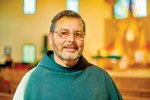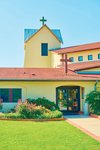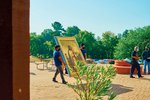


SILER CITY — For Father Julio Martinez, talking about the coronavirus vaccine with his parishioners at St. Julia’s Catholic Church isn’t a burden or political conundrum.
It’s his sacred duty.
“From the very beginning, I have been very proactive and very straightforward with our people about getting vaccinated,” Martinez said. “God has given us the ability to develop the vaccine, and so I have promulgated getting vaccinated among our people here at St. Julia’s and I will continue to do that — to the point that perhaps some people may get a little sick of me throwing in my two cents.”
The church’s congregation, which is more than 80% Hispanic, was hit hard at the beginning of the pandemic in 2020. Though Chatham’s population is about 12% Hispanic, 32% of its total confirmed coronavirus cases are among Hispanic residents, according to the state’s COVID-19 data. After a number of his parishioners fell ill with the virus, Martinez wanted to see his congregants protected through the vaccine.
Throughout the pandemic, some Christians — particularly white Republican evangelicals, national studies and polls have consistently shown — have earned a reputation for being “anti-vaxxers,” staunchly against getting vaccinated and wearing masks. The debate over vaccines and masking has become deeply politicized, and though most health experts uniformly recommend such protocol, many institutions have avoided making declarative statements about COVID-19 to avoid alienating people — including churches.
Yet, churches like St. Julia’s have worked to decrease vaccine hesitancy and refusal. Across Chatham, other churches are tackling vaccinations in their congregations, with Black and Latino churches leading the effort by sharing information with congregants and partnering with the local health department and community organizations to host vaccination clinics.
“I understand the whole spiel about personal choice and personal freedom and all that stuff,” Martinez said. “But there is the very important aspect of the common good. Not just for our local community, but for all of humanity. I want to make sure that our people are healthy, that our people take care of their families and their friends and their neighbors and the local community and society as a whole.”
Among most demographic groups, the percentage of people who refuse to get vaccinated remained steady over six months, according to a July report from the Public Religion Research Institute, a nonpartisan group that studies the intersection of religion and public life and Interfaith Youth Core, a nonprofit focused on interfaith cooperation.
That report found white evangelicals were most likely among religious groups to refuse the vaccine, with 24% of white evangelicals saying in June they wouldn’t be vaccinated, down from 26% in March. The closest following Christian groups were Mormons (19% reported refusal) and Hispanic Protestants (17%).
The report showed positive trends, too. Hispanic Catholics, for example, increased most in vaccine acceptance among religious groups, from 56% in March to 80% in June. Black Protestants were also less likely to say they’d refuse to get vaccinated; 19% said they’d refuse in March while 13% said they would in June.
Among those hesitant to get vaccinated, many take issue with the government “forcing” them to inject something into their bodies, despite an established history of various vaccine requirements in the country to prevent or lower mass death and sickness from viruses like the measles, mumps, chicken pox and polio.
In his conversations with his congregants, Martinez saw a bigger problem than personal choice emerge when it came to vaccine refusal: misinformation. “Bizarre” theories and false or misleading medical studies from the United States and from Latin America instilled deep vaccine suspicion in many people, he said.
Common misinformation, disinformation and conspiracy theories include that the vaccine causes infertility, that the government implants a microchip in the vaccine to track people, that it rewrites your body’s DNA and that it might cause long-term complications. Nearly all health experts strongly disavow such theories, consistently stating the pros of the vaccine significantly outweigh any rare but potential complications; a recent CDC study shows that unvaccinated people are 29 times more likely to be hospitalized with COVID than those who are vaccinated.
“It was very challenging, because there was a lot of misinformation and that really created great fear in them,” Martinez said. “So I had to address that and encourage them to pay attention to the medical and scientific establishment.”
Rev. Charles Mathews of Union Grove A.M.E Zion Church in Bear Creek said about 90 percent of his congregation — which is primarily African American — is vaccinated. When vaccines first became available, though, some congregants had fears about how the vaccine was created and side effects it might cause.
Mathews organized multiple online and in-person discussions on the vaccine, involving local health experts.
“So we’ve done everything that we feel necessary to educate,” he said. “When it comes to vaccination, we give them what’s going on, but I don’t make it necessary or required. I don’t have a sermon given on that … I just try to educate those, so when they’re put in that position, at least they understand.”
1. The Rev. Charles Mathews is the pastor of Union Grove A.M.E. Zion Church, an African-American church in Bear Creek. Throughout the pandemic, he’s worked to talk with congregants about the coronavirus and getting vaccinated. 2. The sanctuary of Union Grove A.M.E. Zion Church. / Staff photos by Peyton Sickles
According to the PRRI and IFYC July report, such faith-based vaccine approaches work with some people who hesitate to get vaccinated.
Nearly four in 10 vaccine-hesitant Americans who attend religious services at least a few times a year (38%) said one or more faith-based approaches would make them more likely to get vaccinated, the report said. A majority of Hispanic Protestants who are vaccinated and attend religious services (54%) said one or more faith-based approaches encouraged them to get vaccinated, according to the report, and 44% said one or more faith-based approaches would make them more likely to get vaccinated.
It’s become a much-debated issue in faith communities. The National Association of Evangelicals, for example, teamed with other partners to create the “Christians & the Vaccine” website to “equip pastors and Christian leaders to help others apply biblical principles” to the question of vaccines. The site, through videos, an FAQ and a “Pastor’s Toolkit,” actively encourages Christians to take the vaccine.
For Martinez’s part, he consulted the Chatham County Public Health Department’s vaccination webpage for information, shared the department’s Spanish resources with the congregation and referred to information about the safety of vaccines in his own conversations with congregants.
He used himself as an example — “Hey look, the vaccine doesn’t kill, but COVID does” — and worked with the health department and the Hispanic Liaison in Siler City to set up three vaccine clinics at St. Julia’s, hosting registrations after Sunday mass.
“What happened was that little by little people began to realize that this was misinformation and bad information that was out there, and they began to free themselves from that fear,” Martinez said. “What also helped people get vaccinated is that when they saw that family members, friends, neighbors, were getting vaccinated, and they were surviving — that empowered them to get vaccinated too.”
The Chatham County Public Health Department has held nine COVID-19 vaccine clinics at churches across Chatham, said department communications specialist Zachary Horner. The clinics took place at Iglesia Bautista Misionera Roca Fuerte Pittsboro and St. Julia’s, two Hispanic churches in Chatham, self-described “non-denominational, multicultural” Liberty Chapel in Moncure and Roberts Chapel Missionary Baptist, an African American church in Goldston.
“Pre-pandemic, we had some faith-based initiatives, and certainly in the pandemic, we tapped into those resources, but we certainly built upon others,” CCPHD Director Mike Zelek told the News + Record. “First, we had a lot of faith communities reach out to us early on for guidance, looking at how to best protect their congregations against COVID. Those were really important relationships to us, too, certainly as we looked at ways to control the spread of the virus, and then building on those with the vaccination efforts.”
In February, 210 vaccines were administered at a clinic at Roberts Chapel. Member Delphine Womack worked with her husband, James Womack, to organize the clinic after hearing that Chatham’s Black residents might be underrepresented in the county’s vaccine distribution.
Vaccine inequity, particularly in Latino and Black communities, is a problem both North Carolina and Chatham health leaders have tried to fix, often by partnering with grassroots events like the one at Roberts Chapel.
“I think it is great when the church can serve an integral role in the community, that we may come alongside people to provide the services and the assistance that they need,” said Rev. Joshua T. Jones, senior pastor of Roberts Chapel, in the CCPHD press release about the February clinic. “In this case, we’re talking about the COVID-19 vaccine. I think we should send a message — not only to our seniors, but to everyone — that this is something we all need to do.”
Some predominantly white churches also opened their buildings to host clinics. In May, the Hispanic Liaison and Better Care, a Greensboro-based medical provider, hosted a bilingual vaccination clinic at Chapel in the Pines Presbyterian Church.
Like Martinez and Mathews, other pastors are also encouraging their own congregants to get vaccinated.
“We want to be an advocate for people to be vaccinated. So articulating the effectiveness of the vaccine, particularly against any misinformation there is,” said Chapel in the Pines’ Rev. Andrew Taylor-Troutman. “This comes out of our belief that our responsibility is to the most vulnerable in our community. We talk about it, we try to shift the conversation from a question of individual rights to community responsibilities.”
At The Local Church in Pittsboro, a progressive, predominantly white church, Rev. Brent Levy said it’s important to talk about vaccinations.
“Our call is to love our neighbor, and the best way right now that we can love our neighbor is to wear masks to help keep one another safe,” Levy said. “And we have been vocal proponents of vaccinations on Sunday mornings as well. We believe, too, that when people are vaccinated that we’re one step closer to being able to fully be who God wants us to be as a community.”
Of course, not all Christians see it that way — specifically some white evangelicals. Some Americans envision Christians as people prone to conspiracy theories and anti-masking more so than as people who love God and their neighbor.
“I think there is a sadness that the portrayal is not unjustified,” Levy said.
In Chatham, as is the case elsewhere across the country, predominantly white evangelical churches are less likely to directly discuss or encourage vaccines — again pointing to the deep politicization of the issue. The News + Record reached out to several evangelical churches in Chatham County about church communication on masking and vaccines, but nearly all declined to comment or did not reply by the time of publication.
Still, when it comes to actually talking with Christians who are hesitant to get the vaccine, it’s tricky, pastors said.
“How we’ve managed it has been much more individual, relational, personal — we have policies that we make, mostly in keeping with the CDC, and kind of local governments, and I’ve had several conversations with people who are anti-mask, anti-vax,” said Alex Kirk, lead pastor of Chatham Community Church, a predominately white church, which describes itself on its website as “gospel-centered” and “biblically guided.”
“What I want to do in these situations,” Kirk said, “is instead to listen to people and hear what’s the ‘why’ behind the ‘what.’”
Brittany Kohan, the campus pastor at StoryChurch Chatham, which is launching later this fall, said she isn’t having direct conversations with congregants about vaccinations. Instead, she’s focused on strictly following health guidelines — to create a space that's safe for people on all parts of the vaccine spectrum.
“As cases rise,” she said, “I’m trying to think about how to create as many outdoor spaces for people to safely gather as possible.”
At the Local Church, even though Levy has been vocal about being pro-vaccine, he wants to be sensitive to the unvaccinated but eligible congregants at his church.
But he also wants them to get vaccinated someday.
“I think sometimes in our quest to tear down walls,” he said, “we inadvertently build them.”
For Taylor-Troutman, making the issue personal is the best way he knows to move people to vaccine acceptance. When people know someone who has suffered or died from COVID-19, getting vaccinated is no longer just an abstract issue, “but a deeply and painfully personal one.”
“What I would hope is that Christians and other faith communities can help give language to the importance of empathy,” he said, “so that we can imagine that personal connection without actually having to endure either suffering or loss of a loved one or friend.”
Zelek said he’s grateful for the role faith communities have played in COVID-19 education.
“I think that message coming from faith leaders is really powerful,” he said. “We’re just hoping to help a little bit and to share the information that we have to empower them to inform their congregants.”
Stay on top of stories that matter. We work hard to document the important people and stories in Chatham. But providing quality news coverage comes with a cost. Please considering subscribing if you support what we do. And for quick access to stories like this, and many others, don't forget to join our newsletter list for free updates sent directly to your inbox.
In addition to navigating conversations about COVID-19 and vaccinations, churches have spent the last 18 months figuring out how to even safely open.
In Chatham, the full gamut of reopening strategies are in place: masking and distancing indoors, online streaming, outdoor worship and parking-lot church using a radio frequency.
Of course, some churches flouted CDC and health guidelines such as masking and distancing, leading to COVID-19 spread. (The information on church cluster location is not public, as is the case with schools and nursing homes, but the News + Record anecdotally heard about several church clusters in Chatham last winter. In North Carolina, there have been 206 reported clusters at religious gatherings as of Tuesday, out of 1,969 total reported clusters, according to the state’s cluster report. That’s 2,845 cluster-associated cases, out of 27,097 total cases reported — about 10.5%.)
Balancing safety with meeting in person has been important for many church leaders, Mathews said.
“We will find a way to make sure that we stay in fellowship as much as we can, because that is a fundamental element of Christianity is the fellowship of being that person of your faith,” Mathews said. “Without the fellowship, Christianity is very hard to live out its purpose, because it’s all about community.”
Part of being in community, Mathews said, is working through your understanding of who God is with others, particularly as the pandemic challenges people to understand their theology.
In the midst of a suffering world in which new crises seem to emerge every day, reminding each other that God knows suffering and is near to the brokenhearted is crucial, Mathews said.
“If anything, we should teach that these are the times where Christianity should stand up and say, ‘We’re near to those who have suffered,’” he said. “So what can we do? We can follow science, and if we don’t, we can still be with those and help them through it.”
At St. Julia’s, such community is vital.
When congregants quarantined and couldn’t work at the beginning of the pandemic, Martinez rallied to create a fund to support his congregants. His goal? That no one at St. Julia’s go hungry or lose their homes.
So far, the church community has raised $17,500 to support its members.
“This whole thing has been very hard on our people, in ways that we know and in ways that are known only to the people that have become infected — families that have limited resources, limited access to health care, limited financial resources,” Martinez said. “The way the community has come together and helped the families that found themselves in those difficult situations is quite powerful and touching to witness.”
In a country and faith too often divided by the politicization of important issues, Martinez said the real sacrament is not the sermons he gives, but the way his people take care of each other.
“And,” he said, “I have been lucky enough to see those living sermons.”
Reporter Hannah McClellan can be reached at hannah@chathamnr.com or on Twitter at @HannerMcClellan.